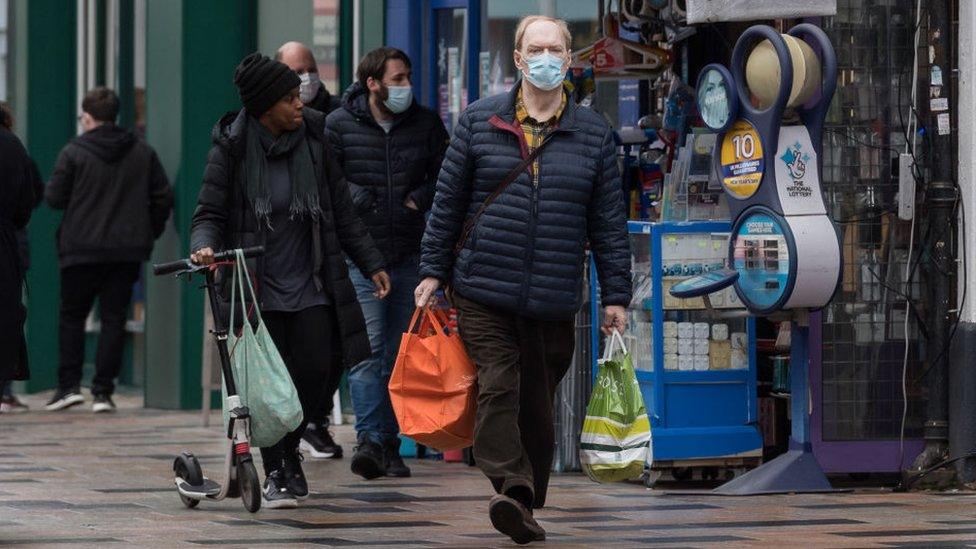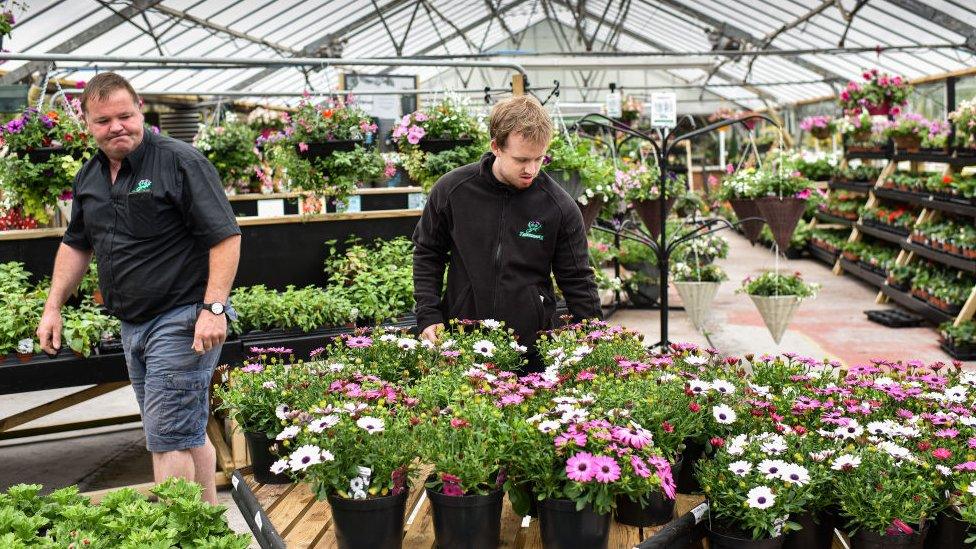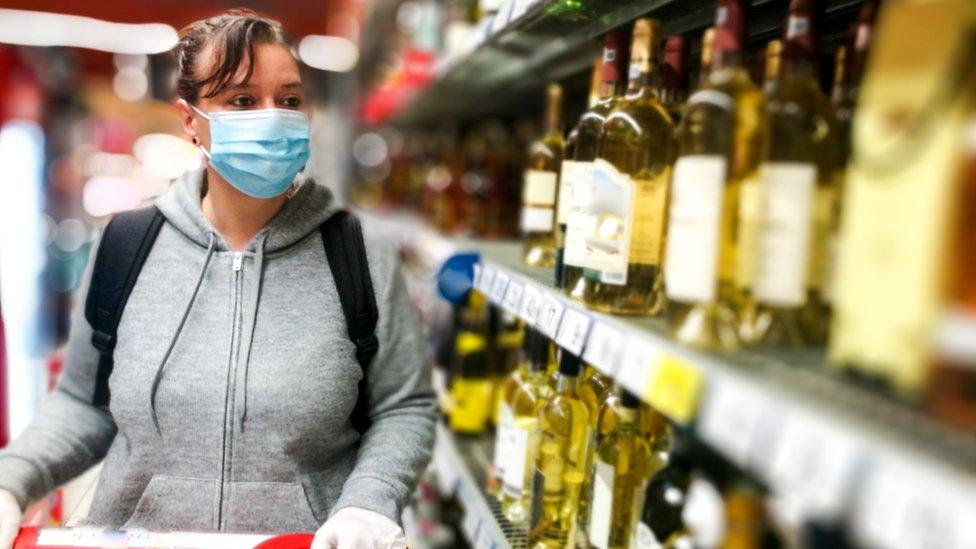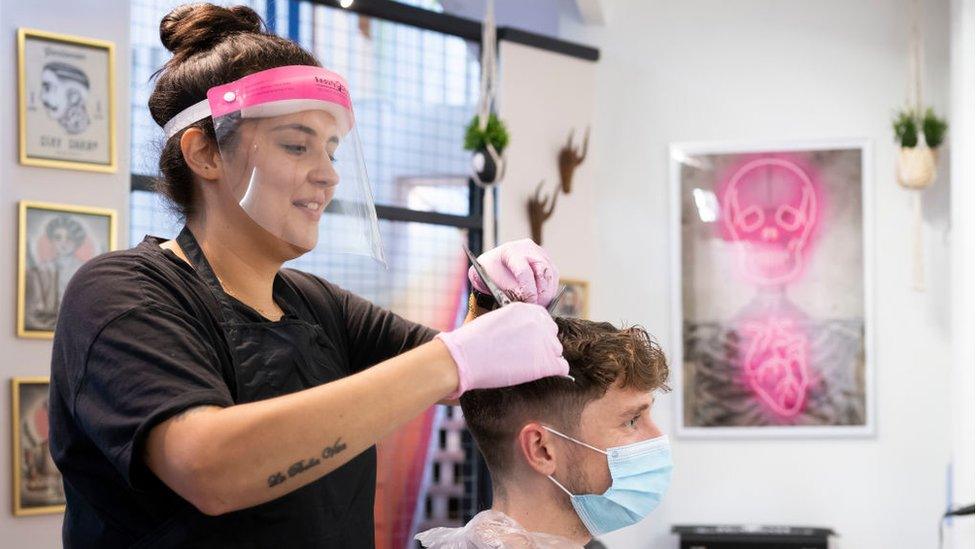Which shops are open and what are the rules about click-and-collect?
- Published

People are allowed to leave home to do essential shopping
Non-essential shops are closed across the UK as part of lockdown measures to combat coronavirus.
Some offer click-and-collect, but Scotland has followed Northern Ireland by restricting this service.
Which retailers are allowed to open?
All shops must shut unless they sell "essential" goods and services, in which case they can stay open if they are Covid-secure.
In England, "essential" retailers include:
food shops, supermarkets, garden centres, hardware stores, building merchants and off-licences
petrol stations, car repair and MOT services, bicycle shops, and taxi and vehicle hire businesses
banks, building societies, post offices, loan providers and money transfer businesses
medical services such as dentists, opticians and pharmacies
vets and pet shops
agricultural suppliers
funeral directors
launderettes and dry cleaners
storage facilities
motorway service stations

Garden centres are still open in England
There are slightly different coronavirus restrictions for each UK nation.
In Scotland, garden centres and homeware stores are not considered essential and are closed.
In Wales, garden centres, homeware stores and markets and shopping centres are shut. Essential retailers must cordon off aisles selling non-essential goods, external. They will also have to introduce new social distancing signs and hand sanitiser, and limit shopper numbers.
In Northern Ireland, garden centres and homeware stores are closed. Off-licences and supermarkets can't sell alcohol after 20:00.
What are the rules for click-and-collect?
In Northern Ireland, non-essential shops are not allowed to offer click-and-collect.
In Scotland, only shops selling essential items and a small selection of "non-essential" items can offer click-and-collect. Collections must be outdoors, with appointments staggered to avoid queuing.
In England and Wales, shops selling non-essential goods can still offer home delivery, or click-and-collect - where goods are pre-ordered and collected from the premises.
These include:
clothing shops
homeware and furniture stores
electronic goods and mobile phone shops
vehicle showrooms (other than for rental)
tailors
tobacco and vape shops
market stalls selling non-essential goods
carpet shops
The retailer John Lewis has also decided to suspend click-and-collect services across the UK. However, customers will still be able to collect John Lewis orders from its Waitrose stores.
Do I have to wear a face covering when shopping?
Face coverings are compulsory across the UK when in shops, supermarkets and shopping centres, unless you are exempt.
Several supermarkets including Morrisons, Sainsbury's, Tesco, Asda and Waitrose have said they will deny entry to shoppers who do not wear face masks who are not medically exempt.

You do not have to wear a face covering if you are a child, if you cannot wear one because of a physical or mental illness or disability, or if its use will cause severe distress.
Official guidance makes it clear that you do not have to show any written evidence for why you are exempt, external.
The government does not provide exemption cards or badges.
If you are self-isolating because you have coronavirus symptoms or have been in contact with someone who has tested positive, or you are in quarantine after travelling, you must not go shopping.
Can pubs, bars and restaurants open?
Pubs, bars and restaurants across most of the UK are currently closed, although they can offer takeaway food and drink with certain restrictions. Alcohol cannot be sold via click-and-collect, but can be ordered for delivery.
In Scotland, from Saturday 16 January, premises offering takeaways can no longer allow customers indoors, and must operate from a hatch or doorway.
Customers aren't allowed to eat and drink outside premises, although there are some exceptions, such as airports.
What about beauty and leisure?
Across the UK, hair, beauty, tanning and nail salons are closed - along with tattoo parlours, spas, massage parlours, and body and skin piercing services. These "close contact" services cannot take place in other peoples' homes either.

Hairdressers must close during lockdown
In addition, hotels, hostels and guest houses are shut to most guests. They can open to business travellers and those who need accommodation to self-isolate, or attend medical appointments or a funeral.
All indoor leisure and entertainment venues are shut, from gyms and swimming pools to theatres, cinemas and museums.

LOCKDOWN LOOK-UP: The rules in your area
SOCIAL DISTANCING: What are the rules now?
SUPPORT BUBBLES: What are they and who can be in yours?
FACE MASKS: When do I need to wear one?
TESTING: How do I get a virus test?

- Published1 July 2022
